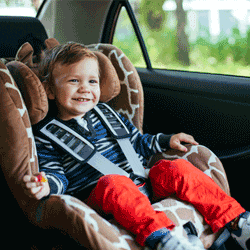Key takeaways
- To know how safe a vehicle is in Australia you can check its ANCAP rating. You should only compare similar cars to judge safety accurately.
- Newer cars on the market are more likely to have new safety features like crash detection technology.
- Prioritise features like airbags, child seat compatibility and crash-avoidance technology over size or style for real-world family protection.
There's a lot to think about when you buy a new car – how much you want to spend, whether to opt for new or used, which model and which colour. When you factor your family into the car-buying decision, there seems to be a lot to think about.
What do you need to think about when picking a family-friendly vehicle, and what features will keep your family not only happy, but safe too? The guide below will take you through everything you should consider when it comes to safe family cars, plus a few extra things to keep in mind.
What are ANCAP safety ratings?
In operation since 1993, the Australasian New Car Assessment Program (ANCAP) has been providing consumers with information about their protection in crashes. It does this by analysing a vehicle's ability to protect vehicle occupants in a crash, to educate consumers about vehicle safety features and a host of other things. It then awards a vehicle a star rating out of five.
According to ANCAP, you have twice the chance of being killed or seriously injured in a 3-star ANCAP safety rated car than a 5-star ANCAP safety rated car. ANCAP currently tests for front-on collisions and side impact testing. From 2018 ANCAP will introduce several new physical crash and performance assessments of safety assist technologies to align with Euro NCAP. This will cause the safety ratings to change.
How to use ANCAP in your safe car search
- Compare vehicles across similar categories. According to ANCAP, "It is not appropriate to compare ANCAP safety rating across vehicle categories, especially if there is a large weight difference." You should compare similarly weighted vehicles or vehicles of the same make, such as SUVS against other SUVs, to see which one has the better rating. Also, don't assume larger vehicles are safer, as this is not always the case.
- Understand the safety features available. New cars coming onto the market have a variety of safety features. ANCAP has stated that it is increasing standards for what it will take a vehicle to get five stars, so manufacturers are always looking for ways to make vehicles safer. Browse through ANCAP's website to learn more about the features available.
What do parents think about when buying cars?
It's easy to have a list of the ten safest cars of 2016. But what will actually work for you and your family? We spoke to some of the finder.com.au parents to find out their experiences with finding cars as parents, what vehicles they drove, what features were most important to them and what their tips were for other parents.
 Safety
Safety
Child seats were a common theme in our respondents' answers. Bessie upgraded to a Subaru Forester for its reputation as a safe, family-friendly vehicle. "We were running out of room in our old car (a Mazda 3), it was feeling very congested which made me worry about the safety implications," she said.
David, a finder.com.au dad, talked about the importance of having an accommodating vehicle when he opted for ridesharing. "As my daughter is so young, it's important for me to have a car that can easily fit a child seat," he said. "As we don't own a car I need to be able to install and remove it on a frequent basis." He says he considered purchasing a new car but instead upgraded his rideshare account on GoGet.
Airbags and safety also ranked high on Fred's list and made him want to replace his car with a family-friendly vehicle.
Size
The size of a vehicle directly correlates to a vehicle's safety. It's important to note that this does not mean "bigger is better". In fact, ANCAP specifically states on its website that "A large vehicle is no guarantee of safety." However, the ability to safely secure items in your car and boot and sufficient leg and head room for passengers ranked highly for safety.
Size also ranked highly for many of the finder.com.au parents. "You don't realise how difficult it can be to get kids and their stuff in and out of cramped spaces," one respondent said. "The car seat might fit in your MINI Cooper, but your back will hate you when you're getting in and out." Remember everything you need to fit in your vehicle when you have a family. Even with one child it means a pram, a car seat, bags, toys, and anything else they need.
However, going out and buying the largest car may not be the best option. "While the appeal for a large SUV exists, particularly for the extra interior space, it may be more practical to downsize," says Scott. "This is in order to provide some extra room outside the vehicle when loading and unloading children in busy or narrow car parks."
Fuel efficiency
While vehicle safety and fuel efficiency don't always go hand in hand, it's an important factor to consider when purchasing a family-friendly vehicle. As Bessie noted, "Parenting is expensive enough without having to worry every time you need to fill up!" Most parents we spoke to did minimal driving during the week but drove around extensively on the weekend taking their kids to weekend activities. Without a fuel-efficient vehicle, the petrol costs can add up quickly.
Car-sharing
David, who opted for car-sharing service GoGet rather than buying a new car, said "We didn't own a car before, and we still don't. But when we were getting closer to having our daughter we upgraded our car share account to bring down the price of hiring the vehicle from $10 per hour to $6 per hour." David says that he does tend to hire the larger vehicles, such as a Toyota Corolla, rather than a Toyota Yaris, to be able to fit in extra items such as prams.
One benefit of opting for a car sharing service is the vehicles all have to pass rigorous safety checks. You can choose the vehicles you're going to use, as well, so you can do a bit of research before signing up.
The little things
- Air conditioning. Alex says, "Believe me, if it goes or was never there with kids in the car, you'll soon know about it."
- Charging. Kids have gadgets, and on longer drives they tend to drain the battery. Make sure you have extra chargers and dual ports to recharge when you can.

- Entertainment and comfort. Keeping your children happy in the car can be hard, but having the wrong car can make it harder. Features such as iPod connectivity so they can listen to their own music or DVDs in backseat headrests can keep them quiet. Another great tip from Fred is making sure the seats are high enough that they can see out of the window.
- Hands-free entry. This was recommended by more than one of our parents. When you're trying to get one or more children in the car and juggling bags, you can see why keyless entry would be a handy feature.
- Car-seat friendly vehicle. Make sure the vehicle fits your car seat, but also that you have enough room for everything else as well. You can also find vehicles with purpose-built child seat attachment points to make things even easier.
Extra tips from the finder.com.au parents
- "Choose practical over pretty. Go for the dark interior over the gorgeous white fabric (it's easier to hide the mess kids inevitably make!). Similarly, two car doors may have once appealed to you but four doors are definitely the way to go when kids are involved."
- "Get a cheap car. It's inevitable that a car whose primary purpose it transporting young children will get trashed over time. Consider saving your dream car purchase for when your children are of an age when they are less likely to damage your expensive toys. Cost and ease of maintenance also play a part here."
- "Remember your kids will likely have friends, so try to plan for your family plus an extra two seats."
- "Do your research. Chat to friends, family and other parents about their experiences and keep this in mind when searching for the perfect car for your own family."
- "When we had our baby on the way we weren't sure of our options. We did consider buying a car but ended up upgrading the type of car share account we have. Don't hesitate to upgrade the account to reduce the hiring costs. The membership cost will pay itself off in no time."
Car safety checklist
Keeping the following things in mind when test-driving vehicles can help you weed out any unsafe cars early on, and end up with a safe car that you'd be happy to purchase:
- What you're buying the car for. Think about how you'll be driving the car and make sure the vehicle has the features to support you. Check for off-road or long distance travel suitability, look for child restraints, towing capabilities and see if there's sufficient storage for your needs.
- Airbags. Check for dual front airbags, curtain airbags and side impact protection, side airbags and knee airbags.
- General crash protection. Ensure the car has load limiter seat belts, an anti-whiplash system, adjustable head restraints a cargo barrier and crumple zones.
- Child restraints. In hatchbacks, there needs to be a clear path between the back seat and the rear anchorage point. In people movers, remember to check the location of the anchorage points.
- Features to avoid crashes. See if there is cruise control, active cruise control and traction control, and also check for a reverse camera and sensors. A light car colour can also help for visibility. An anti-lock braking system, electronic stability control and emergency brake assist can also help with crash avoidance.
- Features to avoid. Bull bars and very large cars, such as 4WDs, can cause unnecessary injuries when they crash. Make sure you check ANCAP safety ratings before you purchase a vehicle.
A safe family vehicle doesn't have to be hard to find if you know what you're looking for. After researching the market and considering your options, you'll be one step closer to getting on the road.
Frequently Asked Questions
Sources
Picture: Shutterstock
Ask a question
More guides on Finder
-
Car loans for pensioners
On a pension but need a new car? There are still many choices if you know where to look.
-
Compare car loans for classic cars
Want to buy a classic car but don't have the ready money? There are still financing options available for classic vehicles. Find out what loans you have to choose one and which one will work best for you.
-
Car loans for casual workers
You can still get a car loan even if you work casually, and there's a range of loans for you to choose from. Find out here how you can get finance for your next car and which loan might be best for you.
-
Quick car loans
You don't need to wait to get car financing. Some lenders can approve you instantly and send your funds on the same day. You can also consider pre-approval. Find out all the ways to get a quick car loan in this guide.
-
How long will it take for your car loan to be approved?
Read our guide to the approval times for popular lenders and how the application process works.
-
Tesla Superchargers Map: Where you can charge in Australia
Find out the extent of Australia's Tesla Supercharger network with our complete map of every charging station.
-
Can you pay off your car loan early?
Repaying your car loan early can save you money, but some lenders impose restrictions and charge additional fees.
-
Compare car loans for students
Ready to get behind the wheel of your own car? Find out how you can get a loan as a student.
-
How to find the best caravan loan in Australia
Don't buy a new caravan until you've read this guide. Find out exactly what financing options are available and how to compare your caravan loan options to find the right loan for you.
-
Used car loan rates Australia
You can still get a car loan if you want to finance a used car. Find out how you can get a used car loan and see what rates are available for the used car you want. Learn how to best compare lenders and apply for your loan today.
